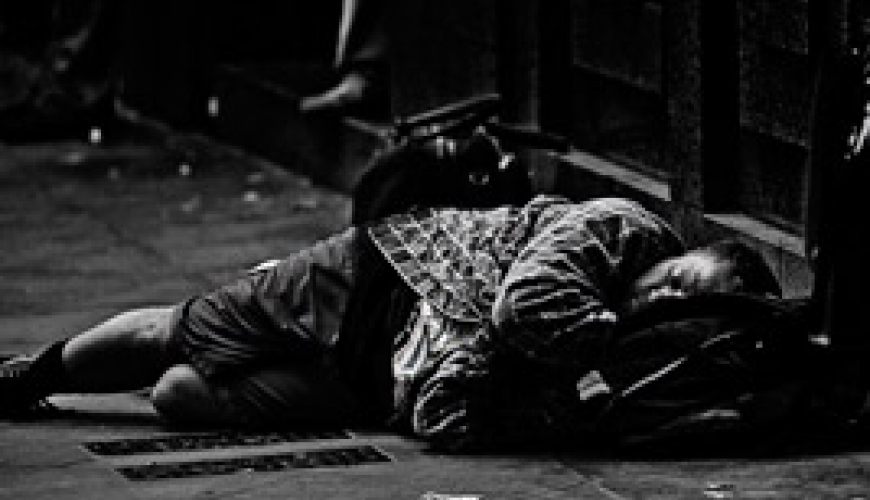Housing, homelessness and human rights

What’s new?
- Australian Government inquiry into homelessness legislation (2009)
- Keynote address by Commissioner Graeme Innes AM to the CEO Sleepout (June 2009)
- The Commission's submission to the Green Paper on Homelessness: Which way home? (July 2008)
What does homelessness have to do with human rights?
People experiencing homelessness face violations of a wide range of human rights. Access to safe and secure housing is one of the most basic human rights. However, homelessness is not just about housing.
A person who is homeless may be facing violations of the right to an adequate standard of living, the right to education, the right to liberty and security of the person, the right to privacy, the right to social security, the right to freedom from discrimination, the right to vote and many more.
These human rights are protected by a number of international human rights treaties, including theInternational Covenant on Civil and Political Rights (ICCPR), the International Covenant on Economic, Social and Cultural Rights (ICESCR), and the Convention on the Rights of the Child (CRC).
For more information see the Commission's discussion paper, Homelessness is a Human Rights Issue.
Is there a right to housing?
Every person has the right to an adequate standard of living, which includes the right to adequate housing (ICESCR, article 11).
The right to housing is more than simply a right to shelter. It is a right to have somewhere to live that is adequate. Whether housing is adequate depends on a range of factors including:
- legal security of tenure
- availability of services, materials, facilities and infrastructure
- affordability
- accessibility
- habitability
- location
- cultural adequacy.
For more information, see Housing as a Human Right.
Current projects
Government inquiry into homelessness legislation
On 26 November 2009 the House of Representatives Standing Committee on Family, Community, Housing and Youth released the report of its inquiry into homelessness legislation. The inquiry followed the Australian Government’s release, in December 2008, of its White Paper, The Road Home: A National Approach to Reducing Homelessness.
The Australian Human Rights Commission made a submission to the inquiry, and encouraged all stakeholders in Australia to participate.
The Commission considers that any response to homelessness in Australia must adopt a human rights-based approach if it is to be effective.
Click here for further information about the inquiry, and to read the Commission's submission.
Past projects and publications
Discussion paper: Homelessness is a Human Rights Issue (2008)
This paper explores the many ways that homelessness impacts on a person’s ability to enjoy basic rights and freedoms. It shows that homelessness is more than just a housing issue. Homelessness is about the enjoyment of a wide range of human rights. Since human rights belong to everyone, it is in the interests of the Australian community as a whole to ensure that the rights of people who are homeless are respected and protected.
Acknowledging that homelessness is about human rights is important for how people who are homeless are viewed and treated by the community. People who are homeless are not merely objects of charity, seeking help and compassion. Like all Australians, they are individuals entitled to protection and promotion of their human rights.
Click here to read Homelessness is a Human Rights Issue.
Speech: Can rights solve issues of poverty? (2007)
This speech was delivered by the former Human Rights Commissioner, Graeme Innes AM, at the NCOSS Conference: Perspectives on Poverty in September 2007.
Housing as a Human Right (1996)
This address was delivered to the National Conference on Homeless Persons by the former Human Rights Commissioner, Chris Sidoti, in September 1996.
Adequate housing is essential for human survival with dignity. Without a right to housing many other basic rights will be compromised including the right to family life and privacy, the right to freedom of movement, the right to assembly and association, the right to health and the right to development.
Australia's response to the right to housing has been a mixed one to date. On the positive side the right to housing is recognised and supported in documents such as Australia's National Action Plan on Human Rights. However, there remains considerable room for improvement, especially in relation to particular groups of Australians, including children and young people, women, Indigenous peoples, and people with mental illness.
Click here to download the address, Housing as a Human Right PDF (23K), Word (27K)
Homelessness and mental illness (1993)
The Commission conducted a National Inquiry into the Human Rights of People with Mental Illness in 1993. The inquiry confirmed that homeless people suffer a high rate of physical and mental health problems. Evidence to the inquiry confirmed the shortage of accessible and appropriate support services for people with mental illness. Further, for a homeless mentally ill person, seeking support is generally a difficult and confusing process. These findings were confirmed by the 2005 Inquiry Not For Service.
Youth homelessness (1989)
In 1989, the Commission conducted a National Inquiry into Homeless Children. It revealed that approximately 25,000 children and young people in Australia were homeless at that time, with many more at risk of homelessness or surviving in grossly inadequate housing. The inquiry demonstrated the link between homelessness and other problems such as unemployment, sexual abuse and exposure to violence. It also highlighted the lack of properly resourced and co-ordinated support services for homeless young people.
- Full report: Chapter by chapter downloads in Word and PDF
- Summary Report of Our Homeless Children (1989) PDF (4.7 MB), Word (820 K)
- More information on the rights of children and young people.
Homelessness and Indigenous people
Australia's Indigenous people experience considerable disadvantage in relation to housing rights as with other human rights. The housing conditions of Indigenous people remain well below those of the general population. This is especially so in rural and isolated areas where housing and infrastructure support are major contributing factors to the poor health of Indigenous people, particularly children.
